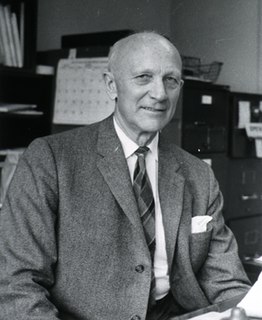A Quote by William Feindel
Made up of a dozen billion microscopic nerve-cell units interconnected by millions upon millions of conducting nerve-threads weaving incredibly intricate patterns, the brain, as an object of research, presents a defiant challenge to its own ingenuity.
Related Quotes
The structure of the human brain is enormously complex. It contains about 10 billion nerve cells (neurons), which are interlinked in a vast network through 1,000 billion junctions (synapses). The whole brain can be divided into subsections, or sub-networks, which communicate with each other in a network fashion. All this results in intricate patterns of intertwined webs, networks of nesting within larger networks.
The task of neural science is to explain behaviour in terms of the activities of the brain. How does the brain marshall its millions of individual nerve cells to produce behaviour, and how are these cells influenced by the environment...? The last frontier of the biological sciences – their ultimate challenge – is to understand the biological basis of consciousness and the mental processes by which we perceive, act, learn, and remember.
Each of us lives within the universe - the prison - of his own brain. Projecting from it are millions of fragile sensory nerve fibers, in groups uniquely adapted to sample the energetic states of the world around us: heat, light, force, and chemical composition. That is all we ever know of it directly; all else is logical inference.
My hand moves because certain forces--electric, magnetic, or whatever 'nerve-force' may prove to be--are impressed on it by my brain. This nerve-force, stored in the brain, would probably be traceable, if Science were complete, to chemical forces supplied to the brain by the blood, and ultimately derived from the food I eat and the air I breathe.
The relative importance of the white and gray matter is often misunderstood. Were it not for the manifold connection of the nerve cells in the cortex by the tens of millions of fibres which make up the under-estimated white matter, such a brain would be useless as a telephone or telegraph station with all the interconnecting wires destroyed.
I think our lives are connected by threads. We're weaving our own quilts as we go along and it has been my experience that there are so many threads that connect people. Invisible threads, strong threads, sparkling threads, but I think there is so much interconnectivity between people and I acknowledge that and I see it all the time. I think some of that is divine.
With its hundred billion nerve cells, with their hundred trillion interconnections, the human brain is the most complex phenomenon in the known universe - always, of course, excepting the interaction of some six billion such brains and their owners within the socio-technological culture of our planetary ecosystem!

































